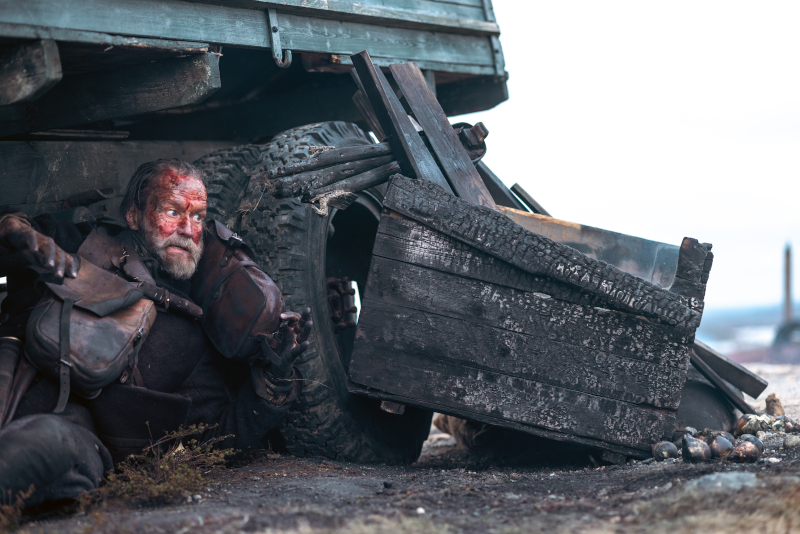Director – Jalmari Helander – 2022 – Finland – Cert. 15 – 91m
****
A gold miner taking time out from WW2 must get past a Nazi unit in the Lapland wilderness in order to deposit his gold at the bank – entertaining but violent gorefest is out in UK cinemas on Friday, May 26th
1944. Lapland. A man (Jorma Tommila from director Helander’s Big Game, 2014; Rare Exports: A Christmas Tale, 2010) has withdrawn from the war to search for gold in the wilderness. The retreating German army, meanwhile, is pursuing a ‘scorched earth’ policy, destroying everything in its path. The man digs. He finds a rich seam of gold. He fills his saddlebags. Now all he has to do is get them to the nearest bank in the nearest town.
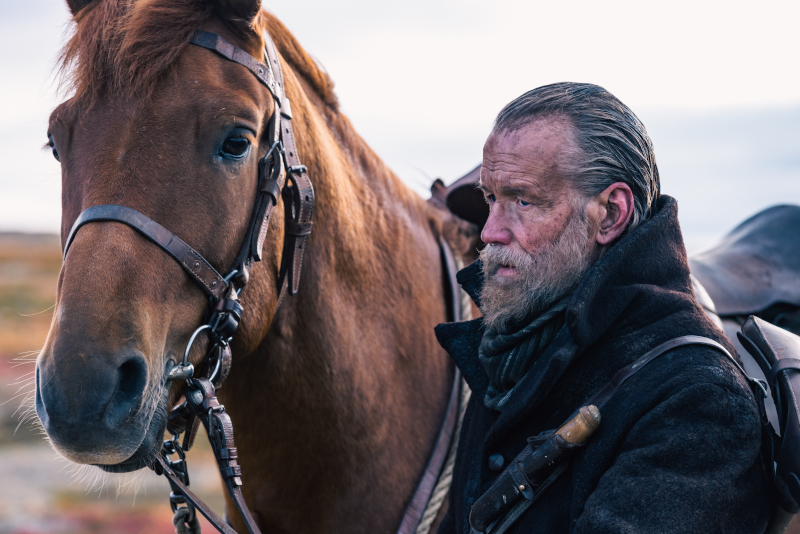
He sets off with his horse and his dog. Between him and his destination is a Nazi unit with a ruthless, sadistic commander (Aksel Hennie from The Middle Man, Bent Hamer, 2021, The Martian, Ridley Scott, 2015; Pioneer, Erik Skjoldbjærg, 2013; Headhunters, Morten Tyldum, 2011), a tank and two lorries carrying German infantry and Finnish women prisoners respectively.
All this takes place in a world where everyone, Finns and Germans, speak English. Except in one or two late scenes where there are only Finns, so, reasonably enough, they speak Finnish (with English subtitles).
The longer trailer (below) gives a pretty good idea of the film, although personally I’m glad I saw the film before the trailer which showcases many memorable moments of mayhem which prove highly effective within the wider context of the film. You would think it was a war film, what with the setting and the Nazi unit, and technically this is clearly the case; however the film looks and feels less like a war film than a spaghetti Western in which a lone man in the wilderness, with his horse and his dog, faces opposition in the form of a gang of callous despots with a group of female prisoners in tow. That feeling is bolstered by the score, with its embedded 1950s guitar twang reminiscent of numerous spaghetti Westerns, notably the scores written by Ennio Morricone for Sergio Leone.
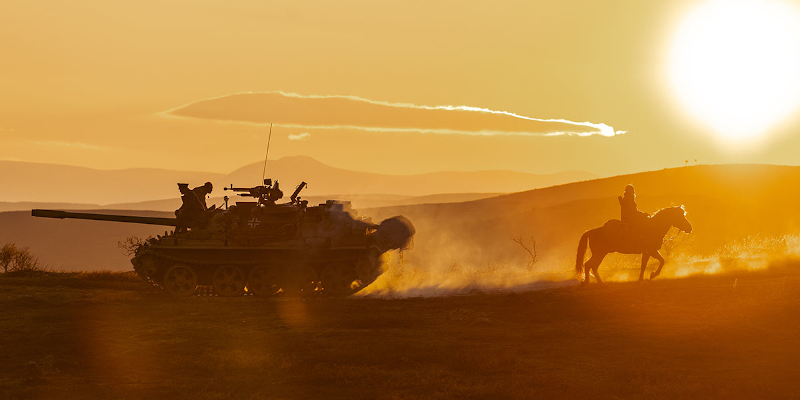
Although the opening titles talk about the retreating German army, and flights of bomber squadrons cross the sky as the man digs with his pickaxe for gold, we never really see a full army, and there are no cast of thousands type scenes; rather, the German military presence in the wilderness is represented by just the one unit with its tank and its lorries. A radio operator in the tank communicates with and relays instructions from HQ, specifically the instruction to retreat and leave the Finn well alone, not least because he is in fact a former commando who operates independently with over 300 Russian kills to his name, all of which conjures a broader picture of more armies and a wider theatre of war beyond what we see here on the screen. And towards the end, the unit commander boards a bomber with just him and a pilot – and the Finn, who has grabbed on to the underside of the aircraft using his pickaxe.
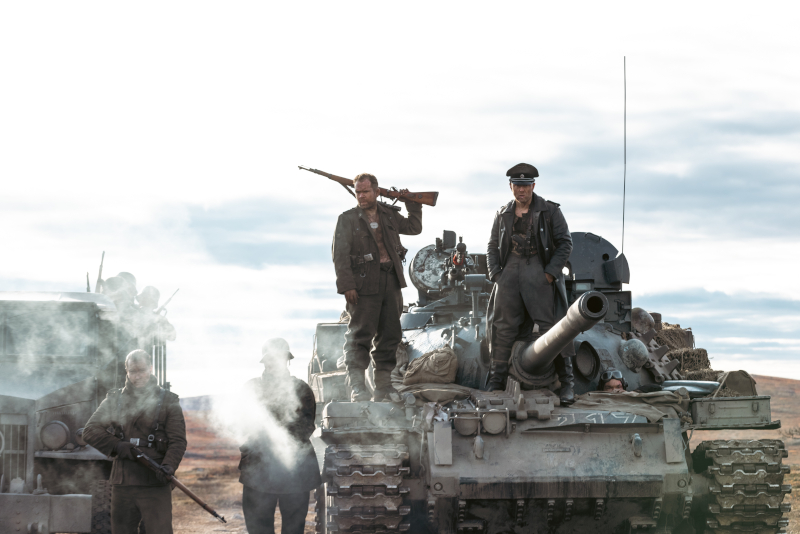
The late incident with the plane gives some idea as to how ludicrous and silly all this gets, at least in its later stages. While the Nazi commander and his immediate entourage are extremely callous and will stop at nothing first to humiliate the Finn (who initially does nothing to antagonise them apart from merely existing) and then (once he starts killing off their unit one by one) to hunt him down and kill him. Weirdly counterpointing this, some of the violence plays out with all the humour of a Roadrunner cartoon. Nowhere is this more perfectly illustrated than in the scene where the commander has two of his men advance across a minefield until they both get gorily blown up in rapid succession, only for the severed lower leg of the second of them to fly through the air and trigger a third mine. It’s dark, unpleasant and horrible yet extremely funny at the same time.
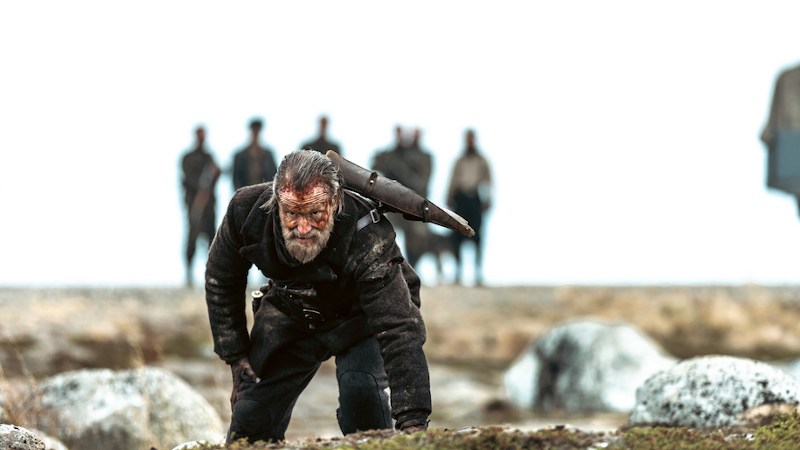
Historically, most if not all uniformed combatants during this period were male. In Westerns spaghetti and other, the vast majority of protagonists of action are also male, with women generally given subservient role as wives, bartenders, good time girls or victims. The hardened, Finnish women comprising the German’s prisoners here have clearly been abused for the soldiers’ sexual gratification (we briefly see one of them having just enjoyed himself) with their proud and undaunted leader (Mimosa Willamo) being offered the chance to explain the untranslatable, eponymous Finnish word which accurately describes to one of their captors the state of the lone Finn now wreaking havoc upon them.
‘Sisu’ describes what happens when everything is taken away from someone, forcing them into a desperate state where the impossible can be achieved. Perhaps, as well as being the film’s core idea and, indeed, its main asset, it’s also its great flaw: some of its protagonist’s achievements are so impossible to believe that the viewer’s credibility is stretched beyond breaking point. For me, this credibility break occurred in a scene about half way through wherein the Finn disappears into a lake and holds his breath while successive, hapless German minions are sent into the water to kill him only to meet their own deaths while he sucks out their final breaths to stay alive.
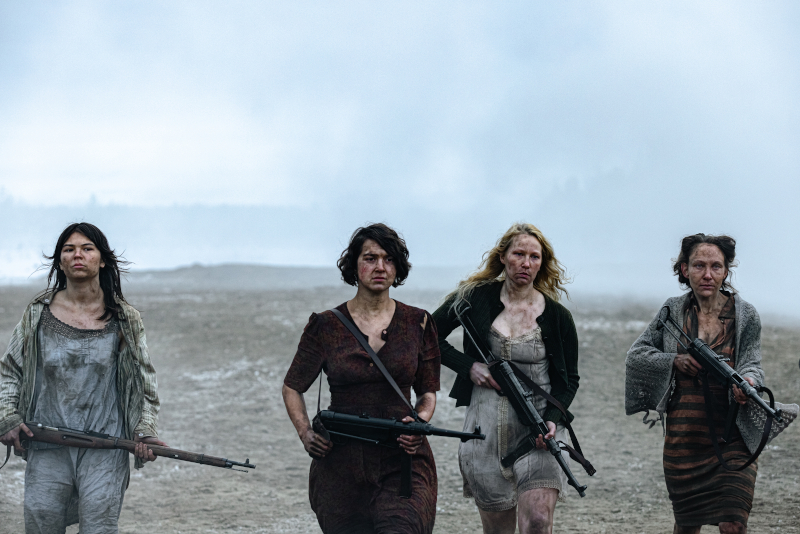
Back to the women: as well as being clearly abused, and one of them (in a rare line of dialogue) relishing the opportunity to explain the title and thrust a little piece of Finnish culture out into the world, they are ultimately given the chance to march fearlessly on the enemy, brandishing guns.
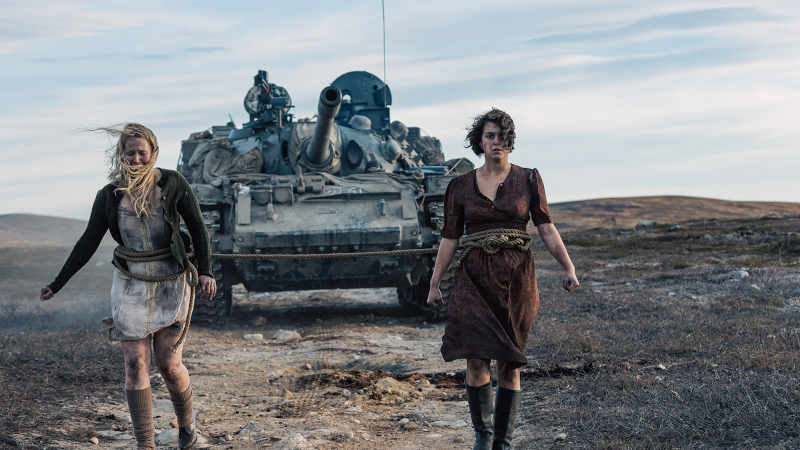
Far more moving is the scene in which two women, roped together, are made to march side by side through a minefield ahead of a tank. Awful, not least since such things almost certainly happen in war. It’s like a rare moment of truth in a movie that mostly feels like a comic book. Stranger still is the sight of the women in the back of the covered lorry, which has braked, with the gun barrel of the tank following penetrating the gap between the two sides of fabric covering at the rear with blunt Freudian symbolism.
With the Finn’s mythic 300 Russian kills, you can’t help but feel this is a Finlander sticking two fingers up at Putin and his current war on Ukraine.
So, a spaghetti Western in war movie clothing, mixing brutality and violence with live action equivalents of Roadrunner cartoon gags. That’ll probably tell you whether or not you want to see it: if you’re on its wavelength, and not everyone will be, this is a relentless heap of bloody, violent fun.
Sisu is out in cinemas in the UK on Friday, May 26th.
Trailer (2m 24s, Cert: 18):
